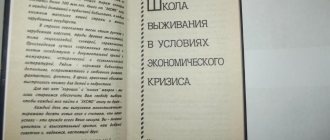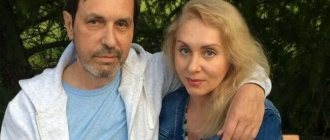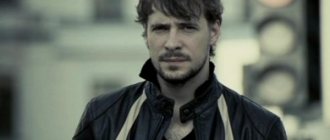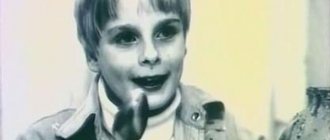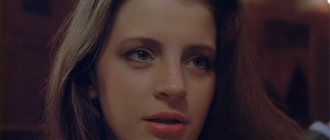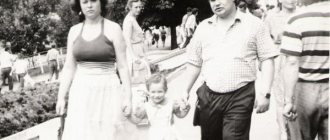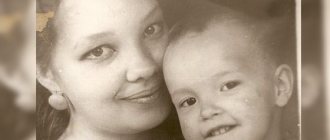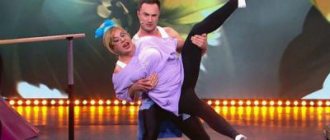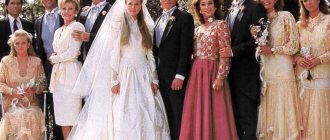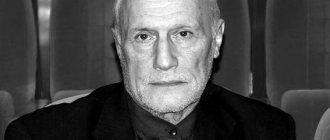Biography
Nikolai Chindyaykin was born in the village of Chernoye, Gorky Region (now Nizhny Novgorod) in the family of a military man.
Kolya’s early years were spent in a kind of unconvoyed state.” These are those who had the right to leave the zone. I still remember these people well - in sweatshirts without buttons, with tattoos on their hands. Usually they came up and asked: “Hi, kid. Do you have a sister?
Despite the fact that the future actor grew up in the post-war and difficult years, his childhood was very happy: “Parents loved their children madly. In our family we were called only Kolik and Lenochka, and nothing else. I remember how my father sometimes sat down at the table, his eyes sparkled, and said: “Children, how happy we are!” They, despite all the hardships and difficulties, were really very happy because they were together.” When Nikolai was a schoolboy, the Chindyaykin family moved to Donbass. There he began going to the theater studio.
“In Alchevsk, I immediately signed up for a bunch of clubs: I drew, played the accordion and accordion, and attended several sports clubs. I communicated with Chapaenka’s company, could sit with them, chat, and then ran to the rehearsal in the drama club. They called me Artist. Even once the whole company came to my performance. I played the main role and according to the script I had to kiss a girl. When the “critical” scene approached, there was a buzz in the hall, the boys began to shout: “Kolya, come on! Let's!"
“My parents were far from art. Dad worked as a mechanic, mom worked as a nurse in a hospital. They were concerned that I went somewhere to rehearse every day. So my father went to talk to the head of our drama club. He returned home and told his mother: “Such a nice, intelligent woman. He speaks well of Kolya. He says he has talent and external characteristics.” Then he turned to me and asked: “Son, what are external data?” the actor recalls.
It was the classes in the drama club that strengthened Nikolai Chindyaykin’s dream of becoming an artist. And in 1964, having dropped out of school in the 11th grade, he left for Rostov-on-Don. On the first attempt he entered the Rostov School of Arts.
“The chairman of the selection committee asked everything again, chuckling: “Repeat again, what is your last name?” - “Chin-dyay-kin.” - “Ha-ha. A chic surname, very theatrical. Well, okay, let’s read...” I just got mad. When he came out, he asked the students: “Who is this guy?” They were absolutely stunned: “What are you talking about?!” Are you applying and don’t know who he is? This is the famous artist – Enver Medzhidovich Behbutov.” And then there was such a famous singer Rashid Behbudov, and that guy turned out to be his brother. And I thought: “Well, damn it, what’s happening? Enver Beibutov is normal for the Russian theater, but Kolya Chindyaykin is funny. Well, no, I will never change my last name,” admits the actor.
In 1987, he received a second education, graduating from the directing department of GITIS, course M.M. Butkevich and A.A. Vasilyeva.
“I had long dreamed of getting a directing education, but I thought that only geniuses get into directing, and I underestimated myself. And he trampled on, trampled his acting path, read a lot, studied, and when he entered GITIS, he was angry: what an idiot I am, 10 years ago I should have come to Moscow to study,” says Chindyaykin.
Theater
After studying at the school, Nikolai came to work in the troupe of the Rostov Youth Theater, where he served for about five years. He appeared on stage in “The Cherry Orchard”, “Dog in the Manger”, “Elder Son” and “April”. Then, by invitation, he went to the Omsk Drama Theater, where he played in such productions as: “Love under the Elms”, “Tsar Boris”, “Bourgeois”, “Dowry”, “Orpheus Descends to Hell”, “Two on a Swing”, “ Last summer in Chulimsk” and many others.
In 1987 he was admitted to the Moscow Theater - “School of Dramatic Art”. Among his prominent roles: Director and Father - “Six Characters in Search of an Author”, Verkhovensky - “Demons”, Rogozhin - “Vis-a-Vis” - a joint project with the Kunstlerhaus Bethanien Center in Berlin based on the novel “The Idiot” by Dostoevsky.
In 2008, Chindyaykin was invited to the Moscow Art Theater to play the role of Firs in A. Shapiro’s play “The Cherry Orchard.” In the same year he became a full-fledged theater artist. He has dozens of works of different genres to his credit: “The Threepenny Opera” - Jonathan Jeremiah Peachum, “Krechinsky’s Wedding” - Pyotr Konstantinovich Muromsky, “Mephisto” - The General, “The Kreutzer Sonata” - The Merchant, “Dear Treasure” - Morin, “The Master and Margarita” - Pontius Pilate.
“I think this is my reward. To be honest, I didn’t count on anything anymore. I thought that I had done my job: five years in Rostov-on-Don, 15 years in Omsk, 20 in Moscow. He starred in almost a hundred films. “Everything ends beautifully,” I thought. And then one day the phone rings and I hear the voice of Oleg Pavlovich Tabakov on the phone, offering me the role of Firs in The Cherry Orchard. I immediately tell him: “Who would refuse such a role, the artists have been waiting for it for years and can’t wait.” This is how I came to this theater for a one-time role.
A year later, Tabakov met me in the corridors of the Moscow Art Theater and said: “Well, will you be our babysitter? Would you like to join the troupe? I wrote an application and, with God’s help, I am playing good roles, including Pontius Pilate in “The Master and Margarita.” I really like the atmosphere in the Moscow Art Theater, it is reminiscent of Omsk - in the meaning, the conscious peace in the troupe, the absence of arrogance, after all, there are stars, stars, stars around. But everyone gets along well, no one bothers anyone, everyone gets along. It’s a pleasure to come to the theater and be there,” says the actor.
Director
After graduating from the GITIS directing department in 1987, Nikolai Chindyaykin began working as a director. His first works were Joseph and His Brothers and The Lamentations of Jeremiah. Co-director of the play-opera “The Queen of Spades” by P. I. Tchaikovsky - production by A. Vasiliev, Weimar Opera House. Then he produced productions: “Athenian Evenings” and “Iron Class”.
“Directing has always attracted me very much. In 1983, I, then an actor at the Omsk Theater, entered GITIS to become a director. Fate gave me meetings with geniuses - Anatoly Vasiliev, Jerzy Grotowski.
I was Vasiliev’s right hand, continued to act, but was more involved in directing; then life took another turn, Vasiliev left Russia for several years, I began acting more, then moved to the Art Theater.
I respect the position of those people who believe: there can only be one thing - either high art or a TV series. But my experience told me something completely different. There are many interests in my profession. And they are of equal value to me. I was wondering if I could stage a purely box office performance - and have the huge hall be full. At the same time, I knew very well that I could stage a play in a small basement, and it would be famous in theatrical circles; they will write about it, they will take it to festivals in Avignon and Edinburgh - but what about mass art?
Yes, I staged my friend Petya Gladilin’s play “Athenian Evenings,” and Olya Aroseva, Leva Durov, and Vera Alentova played in it. And some critics asked: how is it possible that after Vasilyev there was an enterprise performance? And to this I reply: why not? After all, I didn’t cross out what was done by me,” the artist admits.
Theater works
Moscow Chekhov Art Theater:
- “Libra”, Igor
- "The Cherry Orchard", Firs
- "Dear Treasure", Morin
- "Game of Towns", Actor
- “Kreutzer Sonata”, Merchant, aka Egor
- "The Master and Margarita", Pontius Pilate
- "Mephisto", General
- "Cliff", Chairman
- The Threepenny Opera, Jonathan Jeremiah Peachum
- “Krechinsky’s Wedding”, Pyotr Konstantinovich Muromsky
Taganka Theater:
- "The Eldest Son", Sarafanov
Theater "Praktika":
- "Chapaev and Emptiness"
St. Petersburg Theater "Comedian's Shelter":
- “Heart of a Dog”, Professor Preobrazhensky
Moscow theater "School of Dramatic Art":
- "Six Characters in Search of an Author", Director and Father
- “Demons”, Verkhovensky
- “Vis-a-Vis”, Rogozhin
- "Today we improvise"
Omsk Academic Drama Theater:
- "My third year love"
- "Nights Without Stars"
- "Orpheus Descends to Hell"
- "Love Under the Elms"
- "Two on a Swing"
- "Dowry"
- "Alone with everyone"
- "Royal Hunt"
- “Last summer in Chulimsk”
- "Tsar Boris"
- "Ghost"
- "Salty Pad"
- "Barlaam son of Zechariah"
- "Philistines"
Rostov Youth Theater:
- "City at Dawn"
- "Hey, hello"
- "Two Comrades"
- "Dog in the manger"
- “And the dawns here are quiet”
- "April"
- "Eldest Son"
- "The Cherry Orchard"
Film work
Nikolai Chindyaykin first appeared on television screens only in the early 90s. The beginning of his film career was his role in the feature film “The Sea Wolf” based on the novel of the same name by the famous Jack London. The actor was already 43 years old at that time, but despite this he began to regularly appear in films and TV series of the 90s. The actor quickly gained recognition and love from the public. To date, he has more than a hundred works in films and television series. Nikolai Chindyaykin’s last work was released in May 2018 - the drama series “My Life”, in which he played the role of a coach.
Despite a solid baggage of film roles, Chindyaykin gives preference to the theater; since 2008, he has been playing on a regular basis at the Chekhov Art Theater in Moscow. The talented artist also tried himself as a writer - he published an autobiographical book called “I won’t calm down, I won’t go crazy, I won’t go deaf.”
Cinema
Nikolai Chindyaykin began acting at a fairly mature age - at 43 years old. In 1990, Igor Apasyan offered him the role of cook Mugridge in the adventure film “The Sea Wolf” based on the novel of the same name by Jack London. After a successful debut, the directors bombarded him with various offers. He appeared in a number of films - “The Little Giant of Big Sex”, “See Paris and Die”, “Music for December” and others.
In the mid-90s, the actor radically changed his image - he acquired his famous bald head. The actor says: “On this occasion, I came up with a joke: “Chindyaykin is a brilliant artist, especially the bald head.” Of course, I was not born bald. On the contrary, in my youth I had a rich head of hair and wore my hair long. Everyone who now sees my photographs of those years is very surprised. Baldness is a later acquisition. Having noticed the first signs about ten years ago, I did not, like many men, worry or have complexes. I just shaved my head and forgot about it. And when asked if this influenced his work in cinema, he replies: “Yes, and sharply. They started offering me a lot more roles. In general, I call the bald head my nurse.”
“Mom, don’t worry!”
In 1998, Nikolai starred in Maxim Pezhemsky’s comedy “Mama, Don’t Cry!”, playing Major Alexei Ivanovich.
Plot: A cheerful wedding in a small town. Sailor was walking on it. A Tourist appeared and began to pester the bride. The sailor hit the insolent man on the head. The tourist fell. The blow turned out to be fatal. Witnesses, police, elite killers - an uncle and nephew - are looking for the hidden Sailor. The task is not easy...
The artist recalls this work: “I liked working, but there were moments that puzzled me. For example, Maxim Pezhemsky, who directed the film, expressed his opinion and at the same time the entire set of instructions about the acting in one word: cool. “How to play in such and such an episode?: “Play it cool,” he answered.”
Along with Chindyaykin, Gosha Kutsenko, Evgeny Sidikhin, Olesya Sudzilovskaya, Andrey Panin, Alexander Bashirov, Elena Shevchenko, Ivan Bortnik, Sergey Koltakov, Nina Ruslanova, Valery Priemykhov, Ivan Okhlobystin, Sergey Veksler, Maria Mashkova, Victor Verzhbitsky played on the set.
The success of the film “Mom, Don’t Cry!” brought Nikolai Chindyaykin popularity among viewers and aroused further interest from directors. In subsequent years, he played many roles as police officers, bandits, generals, and crime bosses. Among his characters: FSB colonel Emelyanich in the film “The Lion's Share” and mafioso Eduard Denisov in the TV series “Kamenskaya”; Vice-Director of the Police Department Pyotr Ivanovich Rachkovsky in the historical film “Empire Under Attack” and the leader of Islamic extremists Al-Said, nicknamed “Chalma” in the war film “A Man’s Work”; investigator Lyrchenkov in the cult action movie “Antikiller” and businessman, former crime boss Yuri Mikhailovich Pankratov in the criminal project “Gangster Petersburg”; Major Pyotr Antonovich Volkov in the detective story “The Hour of Volkov” and thief in law Yakut in “Platinum”.
"Moscow Windows"
In 2001, the actor appeared in the melodrama “Moscow Windows” by Alexander Aravin, in which he played the role of Yuri Terekhov.
Plot: The 60s were meetings at the Polytechnic, speculation and currency manipulation, a dispute between “physicists and lyricists” and gatherings in the kitchen. Joys and disappointments, intrigues and unexpected turns of fate, sincere impulses and human meanness - all the signs of a good series on native soil. The authors of the series give viewers the opportunity to look into Moscow windows, which store many life stories.
The film also stars Anna Arlanova, Marina Mogilevskaya, Igor Bochkin, Elena Aminova, Ksenia Alferova, Ilya Drevnov, Vladimir Simonov, Maria Aronova, Maria Politsemako, Nikolai Ivanov.
Since 2000, the artist has produced such notable works as: “A Man’s Work”, “Antikiller”, “Gangster Petersburg”, “Under the Polar Star”, “Talisman of Love”, “Children of the Arbat”, “At a Nameless Height”, “ Boys of Steel”, “Alexandrovsky Garden”, “One Family”, “The Sniffer”, “This is What Happens to Me”, “A Year in Tuscany” and many others.
In 2020, he played in the third part of the detective series “The Sniffer,” in which Chindyaykin again appeared as a general. And in 2018, Nikolai appeared in the sports drama “My Life,” where he played the movie character, Mikhail Petrovich, a children’s coach.
Nikolai Dmitrievich notes that he really enjoys acting in films: “I like to come to the set, swear, and get tired like a dog. Sometimes it’s hard, especially when you’re filming three or four films in parallel. You move from set to set and you already forget who you are and how you need to say the text.”
In total, the filmography of the People's Artist of Russia includes about 100 roles.
Chindyaykin Nikolay Dmitrievich
Nikolai Chindyaykin was born on March 8, 1947 in the village of Chernoye, Nizhny Novgorod region. His parents met when his father was captured by fascists during the Great Patriotic War. During the stay of prisoners of war in Belarus, the Germans drove them out to work. The local population also worked together with the prisoners. This is how Dmitry met Stefanida from Minsk.
They met only after the war, when Dmitry Chindyaykin, after a German concentration camp, ended up in a Soviet camp. In 1946 he was transferred to a free settlement. Stefanida arrived there, in the village of Chernoye, Gorky Region. And not alone, but with her little daughter Lenochka, born from prisoner of war Chindyaykin.
9 months after the meeting of Dmitry and Stefanida, on March 8, 1947, their second child was born - son Nikolai. His childhood, despite the hardships, was happy.
Nikolai Chindyaykin received the nickname “Artist” back in school. He became interested in theater after his family moved to Ukraine, to the city of Alchevsk. After a quiet village life, Nikolai wanted to try everything: he played tennis, drew, learned to play the trumpet and accordion, and attended two clubs - photography and radio. I learned German well and even started writing poetry. But the desire to go on stage defeated all others.
In 1964, Chindyaykin entered the Rostov School of Arts. After graduation, he got a job at the Rostov Youth Theater.
Nikolai Chindyaykin appeared on the stage of the Rostov Theater for 5 years. He made a successful debut in the production “City at Dawn”. Then there were the performances “Hey, Hello”, “Two Comrades”, “Dog in the Manger” and many others, where the young artist was entrusted with central roles.
A representative of the famous Omsk Drama Theater once saw a promising actor. He lured Nikolai Chindyaykin from Rostov to the Siberian city. And the young artist did not regret it. After all, in this theater he met his second wife, the wonderful actress and beauty Tatyana Ozhigova. Together they soon became leading theater artists. Almost the entire main repertoire was based on them.
On these stages, Nikolai Chindyaykin received his first recognition and perfected his acting skills. He also felt an irresistible pull to stage plays himself. His wife insisted that Nikolai Dmitrievich go to the capital and enter GITIS. He did just that. Chindyaykin entered the Moscow university with ease and chose the directing department. He studied with the famous mentor Anatoly Alexandrovich Vasiliev.
In 1987, Nikolai Chindyaykin received his diploma, but did not return to Omsk. He was offered a position as a director, actor and teacher at the Moscow School of Dramatic Art, headed by Anatoly Vasiliev.
For a long time, Nikolai Dmitrievich toured abroad with the theater. He took part in the international project “Dostoevsky. "Demons." In Germany, together with Vasiliev, he staged the opera “The Queen of Spades”. And then he interned in Italy, where he studied with the famous Jerzy Grotowski. Chindyaykin turned out to be the only Russian actor who was lucky enough to work with this master.
The cinematic biography of Nikolai Chindyaykin began quite late, in 1990. Then the artist was already 43 years old. But his film career developed rapidly. Today, Nikolai Dmitrievich’s filmography includes 83 films.
His debut role was in the adventure drama “The Sea Wolf”. This is a film adaptation of Jack London's work of the same name, directed by Igor Apasyan. Filming took place at the Odessa Film Studio. Chindyaykin got the role of cook Mugridge. It is noteworthy that Nikolai Chindyaykin had previously considered himself a theater artist and rather stubbornly resisted Apasyan’s persuasion. But today he is eternally grateful to the director for opening up the wonderful world of cinema to him.
It was thanks to cinema that the artist gained wide fame. After The Sea Wolf, directors lined up with proposals. They already knew that this thoughtful and experienced theater actor would play even a cameo role in such a way that it would set the tone for the entire film.
In the mid-1990s, noticing the first signs of baldness, the actor shaved his head and acquired his famous bald spot. As Nikolai Dmitrievich later said with a laugh, his bald head became his nurse. After all, since then he began to receive many specific offers. Chindyaykin played crime bosses, bandits, police generals and officials. Exactly those characters that were in demand in the “dashing 90s”.
In 1998, the wonderful comedy “Mom, Don’t Cry!” was released, in which Nikolai Chindyaykin played a police major. Film critic Artyom Troitsky called this film the best comedy of the late 20th century.
Chindyaykin worked in the top-rated TV series “A Man’s Work”, “Antikiller”, “Gangster Petersburg”, “Volkov’s Hour” and “Platinum”.
Among the best films of recent years, in which fans of the actor could watch his wonderful performance, are the projects “Under the Polar Star”, “Talisman of Love”, “Children of the Arbat” and “Alexandrovsky Garden”.
07.03.2018
Writer
Chindyaykin published a book in memory of his second wife, actress Tatyana Ozhigova. He says: “I was the initiator of that book, and Tanya’s friend Lida Pugacheva collected it. There is a lot of correspondence between Tanya and me, poems, fragments from diaries, some written by Lida herself. On my part it was a kind of “I love you” and “I’m sorry.” It seemed to me that this was my duty to her; Tanya was a brilliant actress. She died in 1989, and I wanted her memory to remain... I don’t know how good a writer I am. I used to write a diary every day; I had already accumulated a lot of notebooks. Now you need time to sort through your notes. My wife, she’s a smart girl, she read it and says it’s amazing, they say, you don’t need to redo anything at all, just send it straight to the printing house.”
Personal life
The actor has three marriages behind him. He met his first wife Natalya at the Rostov School of Arts. Afterwards they worked together at the local Youth Theater. While still studying, when they were 18 years old, they decided to start a family. The couple had a daughter, Anastasia. After five years of marriage, the union of Nikolai and Natalya cracked.
The second wife was actress Tatyana Ozhigova. She was the youngest People's Artist of the Soviet Union. She received the title at the age of 34. The affair with Ozhigova began in Omsk, where they worked together in the local theater. Tatyana Ozhigova died in 1989 from cancer, which was a strong blow for Chindyaykin.
Three years after a personal tragedy, a new student appeared on Vasiliev’s course - Rasa von Tornau, a young actress who came to Moscow from Vilnius. They met and at first they just talked. “They existed like this for quite a long time, until I was convinced that nothing else could exist. After all, a wife is a different understanding,” recalls Nikolai Dmitrievich.
Two years later they got married. In an interview, he admits: “Race is absolutely my wife. Exactly my man. If I hadn’t met her, no one else would have appeared.”
Nikolai Chindyaykin’s daughter Anastasia received an economics education and is engaged in business. Nastya married actor Vadim Shanaurin. The couple are raising sons Alexei and Artem.
In his free time from cinema and theater, Nikolai Dmitrievich writes poetry, reads philosophical treatises, and sings lyrical songs with a guitar.
The actor spoke about the details of his personal life in the program “The Fate of a Man with Boris Korchevnikov.”
Biography[ | ]
Nikolai Dmitrievich Chindyaykin was born on March 8, 1947 in the village of Urensky district, Gorky region.
In 1959, the actor’s family moved to Ukraine, to the city of Voroshilovsk (Alchevsk). From here in 1964 he left and entered the Rostov School of Arts. After graduating from college in 1968, he worked at the Rostov Youth Theater and the Omsk Drama Theater. Then, after graduating from the directing department of GITIS in 1987, he began working as a director, actor and teacher at Anatoly Vasiliev’s School of Dramatic Art.
Since 1989, he began acting in films and television series.
In 1987 he was awarded the Theater Life magazine prize for the best production of the season, and in 1997 he was awarded the Golden Mask National Theater Award.
Since 1996 he has been teaching at the Russian Academy of Theater Arts.
Since 2008 - actor of the Moscow Art Theater. Chekhov. As a guest artist he plays in performances of the Taganka Theater[2].
Interview
Parents' love story
“When the war came, dad was serving in conscript service in Kyiv, and they began to be bombed right at 4 am on June 22, 1941 - his auto regiment was located on the territory of the air force. Dad was very reluctant to talk about the war, but he talked about how it all started. It was early morning, no one understood what was happening. Maybe the officers still realized something, but the soldiers... And at first, when the planes began to hum with a terrible roar over the city, and a thousand-strong armada was flying, everyone looked at the sky in shock and admired: “What power!” They thought Soviet aviation was flying. And then suddenly the bombs started flying... Dad managed to get out of the first encirclement, but at the end of 1941 he found himself in the second encirclement - the most terrible months, when almost the entire army died. Dad was released from captivity at the end of the war near Frankfurt am Main, and before that he was in a concentration camp near Brest. There they met their mother. Prisoners of war were herded to work along with the local population, and my mother, from near Brest, worked as nannies with her sister before the war.
Dad fell in love with this unusually beautiful village girl. And she's into it. And in this nightmare of war and captivity, they began an affair. But soon dad was transferred to another camp. When he left, he did not know that his mother was pregnant. She herself didn’t know it then... After the victory, dad again found himself in prison, now in Soviet custody - in the Gorky region, in that same LZK of ours. He spent about a year directly in the zone - he worked in a logging camp. By the way, it was not called a prison. It was a control and filtration camp. They were explained this way: “You were on enemy territory, working there. So we have to check you." From there, dad endlessly wrote letters to Brest and its suburbs, hoping to find the girl he loved. Incredibly, she was found - alive, healthy, living in the village, raising her daughter Lenochka...
Finally, dad was transferred to a free settlement. According to prisoners' slang - five years "on the horns" with deprivation of voting and all civil rights. Work - in a logging site. That is, everything is the same as before, you can’t go anywhere just the same, only now you also have to feed yourself - that, in fact, is the whole difference. And yet there was the main difference - Stefanida and my one-year-old sister moved in with my dad. That's when I was born. According to my modest calculations, my parents did not delay in producing me. Everything is clear: my sister and I are one year and ten months apart.”
Childhood dreams
“I have to admit... As a child, I dreamed of becoming an artist. I don’t know where this thought came into my head. He painted a lot, even painted in oils. It’s comical, but then all my “works” were burned. Literally burned out. I smoked in secret from my parents. It's good that the house didn't burn down. Then the theater interrupted all other interests. However, even now, especially when insomnia and solitaire no longer helps... I take a pencil... and so on until the morning.”
About the roles
“I’m trying to find something close to me in the character. An actor playing a character he is not interested in is the same as a director working with an actor he doesn’t like. You're ruining his life and yours too. So I can say that I love them all. Of course, there are more relatable characters. Yesterday a young man came up to me and asked permission to take a photo with me because he was watching “Boys of Steel.” He himself is a boxer and said that he could immediately see that I was a boxer. (So according to the role.) I have been involved in various sports, but never boxing. And the hero of this series, Rogov, is a role that unexpectedly came to me.”
Performance “Heart of a Dog”
“Some of Bulgakov’s works are amazing because (these are all my home discoveries, I use them) that they were shot at a certain time, in the late 60s. And especially, “Heart of a Dog,” of course. Our social environment was then infected with the ideas of revolution, massive shifts, and changing the world. And not only here. I have traveled a lot around the world and everywhere I have been, and it is so amazing to meet somewhere in Mexico with followers of the Third International. Seeing the Trotsky Museum and learning that great artists like Siqueiros not only supported the revolution, but also actively participated in it. And suddenly a certain text appears about the 1920s in Russia, written by a witness of that time...
Not only Sharikov, but also the intellectual Preobrazhensky. He constantly explains to his colleague, Doctor Bormenthal, that he is an enemy of unfounded hypotheses, that he is a man of observation, experience, and now he will explain everything. And we are all waiting: what will this brilliant professor tell us about this time of such importance. And he talked about galoshes. About galoshes! About some trampled carpets. About people who don't know how to go to the toilet normally. He talks about completely anecdotal things. And suddenly we understand some of the most complex aspects of the world that we could not fully understand through philosophy and social literature. And texts like “Heart of a Dog” gave us new energy. I remember how she went to samizdat. I myself took part in this - I will never forget how I reprinted “Fatal Eggs” in five copies... So, of course, when Maxim Didenko invited me to take part in his play based on “The Heart of a Dog,” I said “yes.”
Jerzy Grotowski School
“I have never been abroad just as a tourist in my life, always exclusively for work. Because of this, at the age of forty I had to start studying foreign languages. I remember when we came to London for the first time with the theater, the artists I knew spent all their money on some kind of video equipment, and I spent all on English textbooks. Then we worked in Italy for a long time, and I began to understand Italian. There I was lucky enough to study at Jerzy Grotowski’s experimental center. In other words, in his acting laboratory...
Today Grotowski is no longer alive, but the school exists, run by one of his students, Thomas Richards. When I was in Italy, Jerzy himself worked with us. In the theater world they don’t call him anything other than a guru. “I started where Stanislavsky ended,” said Grotovsky. Pan Jerzy invented psychophysical trainings, which outwardly, to make it clear to readers, resemble yoga. Grotowski believed that the actor's body is an instrument that needs to be tuned. An atmosphere of sacred action reigned in all his classes. Everything was regulated - how to sit, how to stand, where to leave shoes. I still use these trainings to this day. But getting into school was really not easy. I was lucky, I am the only Russian actor who studied in Popularity is a pleasure. But at the same time, I understand that this is far from the most important thing. As my teacher Anatoly Vasiliev says: “It doesn’t matter what kind of performances we stage, it’s important how we live our lives.”
About health
“Most of my life was spent on the brink of death. In my youth, doctors sentenced me. This happened in the first year of theater school in Rostov-on-Don. The guys and I were going to go to Artek as pioneer leaders. We needed certificates from the clinic. They gave it to everyone, but they told me: “I need to urgently go to the hospital.” I was diagnosed with a serious kidney disease that was progressing. I was in the hospital for six months. The situation was becoming critical. And then the parents learned that in Turkmenistan there is a unique sanatorium “Bayram Ali”, the only one in the USSR, where even the climate helps treat the kidneys. It was almost impossible to get there. But my father knocked on the doorsteps of trade unions, wrote letters almost to the government. And they got me a ticket. This place became a second home for me, I went to Turkmenistan every summer.
We had a group of young girls and boys gathered there, many of whom were doomed. But at the same time, life was filled with so many poems, novels, breakups, and incredible passions. We corresponded all year round. Then they came together again. Every time someone was missing. And today, besides me, there is no one left alive from that company of ours...
At the school, and then at the Rostov Theater, few people knew about my problems. I tried not to advertise it. However, I had to live very carefully, with an eye on the disease. It was very depressing, at some point I burned out, I was tired of everything around me.
And then I received an invitation to the Omsk Drama Theater, which was very famous in those years. He left his family and went to Siberia. In Omsk I decided: come what may, I will live like normal people. And on the very first day I drank vodka as a guest. After that, I was sure that the next morning I would die or, at best, end up in the hospital. But nothing happened, or rather, a miracle happened. The kidneys did not fail and continued to function normally. And soon the examination showed that everything was normal with me. The doctors couldn't believe their eyes. “It doesn’t happen like that,” they said.
I believe that I was saved by my mother, who prayed to God every day for my recovery. She also turned into a healer, all the time collecting herbs, drying them, and making infusions. My mother passed away in 1993, and I still have the bag of rose hips she collected.”
About luck
“I'm lucky. Look how interesting it turned out. After graduating from college, I worked in Rostov for five years, then in Omsk for 15 years, then in the Anatoly Vasiliev Theater for 20 years, and now, for five years now, I have been serving at the Chekhov Art Theater. Beautiful, is not it? And if we continue this progression, then I should stay here for at least twenty-five years... And recently another happy page in my life opened - I started playing in a musical! Misha Shvydkoy, with whom, I must say, we are old friends, called me, and quite unexpectedly offered to play in the musical “You Can’t Choose Times.” Matt Frey is the owner and host of the radio station, which he inherited from his mother, an outstanding American singer.
Then he said: “I really wanted to get you for this role, but there was no hope. I had no doubt that you would send me to hell...” And I... I’ve always been involved in music, I loved musical performances. I, a boy from the village, absolutely loved the operetta theater. But you couldn’t talk about it at school - they’d kill you. How can you! You are a dramatic artist and you like this vulgarity?! But I constantly sneaked into the operetta, sat on the balcony and then sang all the parts by heart. In short, when Misha called, I thought: “Lord, what a gift! Just pretend that they don’t understand this, otherwise they won’t pay the money...” It had to be introduced quickly, within nine days. The conditions are tough, but how great it is: at my age, to suddenly sing and dance, by the way, to amazing music.
This is simply fantastic! Of course, at the first performances I did not experience any joy, except for the very fact of participation. It was very difficult. But gradually I entered a state where you clearly feel: everything has already been worked out. And then gradually what I dreamed of began to come true: to receive only one pleasure from participating. Grandson Lesha, after watching the performance, said: “Grandfather, you’re absolutely super!..” Well, isn’t all this luck?.. You understand, I got to my feet without any support, no, so to speak, “hand” . I was always left to myself, always for myself, and therefore everything that I have today was obtained by me personally, with my modest capabilities. And I’ll be honest: I like my path. For a long time now I have been allowing myself not to do what I don’t want to do. It took me a while to realize this. While I was growing up, I was forced and obliged to do many things, and then suddenly I felt: some bar had been overcome, I had already earned myself the right to be independent.
I won't do this, don't even ask. Why? Yes, simply because I don’t want to. But this is interesting to me, this is what I will do... Actually, this, it seems to me, is my most important achievement in life and, perhaps, the main meaning.”
Filmography: Actor
- My life (2018)
- Sniffer-3 (2017), TV series
- Sniffer-2 (2015), TV series
- Good Hands (2014), TV series
- On the edge. Strike Back (2014)
- A Year in Tuscany (2014), TV series
- The Sniffer (2013), TV series
- PPS-2 (2012-2013), TV series
- This is what's happening to me (2012)
- The Cherry Orchard (2012)
- Hour of Volkov-5 (2011), TV series
- Enigma (2010), TV series
- Hour of Volkov-4 (2010), TV series
- Alice's Adventures. Prisoners of Three Planets (2010)
- Hour of Volkov-3 (2009), TV series
- Savva Morozov (2009)
- One Family (2009)
- Hour of Volkov-2 (2008), TV series
- Autumn Detective (2008), TV series
- Street Racers (2008)
- Viy (2008)
- Alice's Adventures. Prisoners of Three Planets (2008)
- Witch Doctor (2008), TV series
- Chaclun and Rumba (2007)
- Servant of Sovereigns (2007)
- Alexander Garden (2007), TV series
- Ellipsis (2006)
- Gangster Petersburg-7. Peredel (2005), TV series
- The Princess and the Pauper (2005), TV series
- Mom Don't Cry-2 (2005)
- We Die Together (2005)
- Multiplying Sorrow (2005), TV series
- Icon Hunters (2004), TV series
- At a Nameless Height (2004)
- Children of Arbat (2004), TV series
- Boys of Steel (2004), TV series
- Women in a game without rules (2004), TV series
- MUR is MUR (2004)
- Lines of Fate (2003), TV series
- Mail order bride (2003)
- Theatrical Romance (2003)
- The Best City on Earth (2003), TV series
- As if it weren't so (2003)
- The Cage (2003), TV series
- Looking Down (2003), TV series
- I am a doll (2002)
- Antikiller (2002)
- Kamenskaya-2 (2002), TV series
- Kamikaze Diary (2002)
- Truckers (2001), TV series
- Men's work-2 (2001), TV series
- On the Move (2001)
- A Man's Work (2001), TV series
- The Lion's Share (2001)
- Moscow Windows (2001), TV series
- It is not recommended to offend women (2000)
- Kamenskaya (2000), TV series
- Tender Age (2000)
- Black Room (2000)
- Bushido (2000)
- Mom (1999)
- Who else if not us (1998)
- Full Moon Day (1998)
- Mom, Don't Cry (1997)
- Music for December (1995)
- Silent Witness (1994)
- As the crow flies (1992)
- Sea Wolf (1990)
Filmography[ | ]
- 1990 - Sea Wolf - Thomas Mugridge
- 1992 - Little giant of big sex - officer
- 1992 —
- 1992 - See Paris and die - Luda’s father
- 1994 - Silent witness - Vladimir Pekar, police major
- 1995 - House - Aslanbek Alisherovich Rakhmetov, house manager
- 1995 - Music for December - Samoilov
- 1997 - Dandelion Wine (Russia, Ukraine) - drunken amusement park supervisor
- 1997 - Mom, don’t worry - Alexey Ivanovich, major
- 1998 - Full Moon Day - Glory
- 1998 - Who, if not us, is the head of the colony
- 1998 — — prosecutor
- 1999 - It is not recommended to offend women - Mikhail, lawyer
- 1999 - Mom - head physician
- 1999 - 2000 - Kamenskaya - Eduard Petrovich Denisov, crime boss
("Game on a foreign field", "Reluctant Killer") - 2000 - Empire under attack - Pyotr Ivanovich Rachkovsky, Vice-Director of the Police Department
- 2000 - (“No more bets”) - Gregory
- 2000 — Turkish March (first season) (“Dangerous Hobby”) — Vitaly Aleksandrovich Bai
- 2000 - Moscow - Plum
- 2000 - Tender age - psychoneurologist
- 2000 - 2001 - Black Room (film almanac) - Nikolai Ivanovich, banker
(short story "Bushido") - 2001 - Truckers - “Padre”, authority
- 2001 — — Lukin
- 2001 — — Emelyanich, FSB Colonel
- 2001 — — Yuri Terekhov
- 2001 — — episode
- 2001 - I am a doll - the head of the camp
- 2001 — 2002 — — Al Said
- 2002 - On the Move - Mityagin
- 2002 - Antikiller - Larchenkov
- 2002 - Kamikaze Diary - Maxim Krivoshein
- 2002 - Kamenskaya 2 - Eduard Petrovich Denisov, crime boss
(“You have to pay for everything”) - 2002 — — Matvey Semyonovich
- 2002 - Theatrical novel - Rudolphi
- 2003 — — Old people
- 2003 - (Italy-USA-RF) - Uncle Petya
- 2003 — — Yuri Terekhov
- 2004 — 2005 — — Boris Rogov
- 2004 - Children of Arbat - Lavrentiy Beria
- 2004 - Saboteur - Lieutenant General Voronkov
- 2004 — — Kuzmin
- 2004 — — Boris Kulachev
- 2004 — — Anna's father
- 2004 — — Ivan Vasilievich, Commissioner of the Moscow Criminal Investigation Department
- 2004 — — Dima's dad
- 2004 - At an unnamed height (Russia, Belarus) - Egorov
- 2004 - Parisian Love Kostya Gumankova - merchant
- 2004 — — Arkady Konstantinovich
- 2005 — 2007 — — Varfolomeev
- 2005 - Gangster Petersburg. Film 7. “Redistribution” - Pankratov
- 2005 - Mom don’t worry 2 - Major Alexey Ivanovich
- 2005 — —father Nikodim
- 2005 — — Lev Alexandrovich, Lieutenant General
- 2005 — — Gabriel Uvarov
- 2005 — — Safonov
- 2006 — — Rear Admiral Ivan Mitrofanovich Kunitsyn
- 2006 - Ellipsis - Nikodim Sergeevich, doctor
- 2006 - Orange sky (Ukrainian Pomarancheve sky, Ukraine) - Zaduha Sr.
- 2006 — — Mikhalych
- 2006 —
- 2007 — — Gennady Dmitrievich
- 2007 — — Krivtsov
- 2007 - Canned food
- 2007 — — Yakut (Vladimir Borisovich Yashchenko) “thief in law”
- 2007 — — Lobnik, professor of optical physics
- 2007 — — Albert Borovsky
- 2007 - Yeralash - school director
(issue No. 214, story “Deuce”) - 2007 - Servant of the Sovereigns - Inn Owner
- 2007 — — Burygin
(film “Games without Rules”) - 2007 - (Belarus) - surgeon Nikolai Dmitrievich
- 2008 - (Russia, Ukraine) - Arkady Rostovchin
- 2008 - Witch Doctor - Colonel Sogrishin
- 2008 — — San Sanych Kabakov
- 2008 - Street Racers - Stepanchenko
- 2008 — — Vladimir Bondarev
(“Adult Games”) - 2008 — — Pyotr Antonovich Volkov
- 2009 — — Yuri Vladimirovich Skvortsov, FSB Colonel
- 2009 — — Savva Mamontov
- 2009 — — Pyotr Antonovich Volkov
- 2010 — — forensic scientist
- 2010 — — Pyotr Antonovich Volkov
- 2011 — — Pyotr Antonovich Volkov
- 2012 — — Bugrov, head of the police department, colonel
- 2013 - 2020 - The Sniffer - General Bondarev, head of the SBR
- 2013 - Miracle - Boris Alexandrovich
(short story “Voices”) - 2014 — — Nikolai Alexandrovich Farbey, father of Gleb, Marina and Anya, oligarch
- 2014 — — Grigory Vasilievich Shikhtin, military prosecutor
- 2014 — — Boris Vladimirovich Zakharov, prosecutor
- 2018 - My life - a football coach
